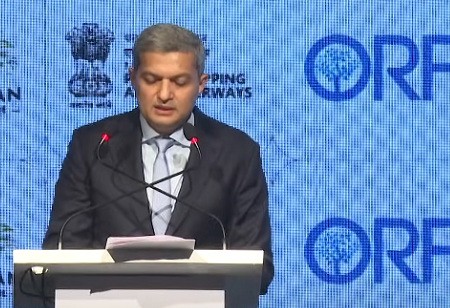
In the first edition of The Sagarmanthan 2024, hosted by the Observer Research Foundation (ORF), Rizwan Soomar, CEO & Managing Director, Middle East, North Africa & India Subcontinent, DP World, United Arab Emirates, elucidates how vital it is for a nation, especially emerging economies to have a robust maritime trade infrastructure and a supply chain. Some key insights from his talk are addressed here.
As the future of maritime trade is unfolding, it is vital to understand the crucial role of connecting emerging economies through multimodal corridors. These emerging economies will be the driving force of the next phase of global growth. Maritime and logistics will be key enablers.
Trade is the backbone of global commerce, with nearly 80% of global trade moving by sea. For landlocked economies, access to global maritime trade is essential to meet domestic demand and participate in global value chains. At DP World, we believe connecting these emerging markets to the global maritime network is a social and economic necessity.
Countries in Africa, South and Central Asia, and Latin America, with rapidly growing populations, are driving demand for goods and services. The role of multimodal trade corridors is undeniable. Traditional trade corridors are concentrated, as evidenced by the Suez Canal crisis, which disrupted global trade. The Malacca Strait handles 20.5% of global trade, the Suez Canal 12%, and the Panama Canal 15%. This concentration poses a significant risk to global trade resilience.
To connect emerging economies and build resilient supply chains, we must develop alternative multimodal trade corridors. Investing in the right transportation infrastructure at the right location and capacity is crucial. The World Bank estimates that every dollar invested in transport infrastructure yields a $4 return in economic growth.
Trade corridors like the India-Middle East Corridor (IMEC) and the International North-South Transport Corridor (INSTC) are prime examples of multimodal corridors with immense potential to diversify traditional routes and enhance global trade resilience.
Infrastructure, logistics, and maritime trade remain major challenges for emerging economies. The growing middle class in these markets, projected to triple by 2030, demands robust transportation infrastructure. To meet this demand, we need to address the complexity of supply chains and dynamic demand through adequate port capacity, streamlined logistics infrastructure, and processes that can adapt to geopolitical shifts.
To achieve this, we must focus on three key pillars:
Integrated Supply Chains
It is imperative to seamlessly link ports to hinterlands through roads, railways, and last-mile connectivity while ensuring efficient information and documentation flow alongside cargo.
Sustainability and Resilience
Every organization must commit to net-zero emissions and leverage multimodalism for sustainable transportation choices while reducing carbon emissions through coastal, rail, and road transport.
Digitization and Innovation
Digitization via the adoption of electronic trade documentation to reduce processing time and costs and the implementation of blockchain platforms for trust-based systems and efficient information flow will be beneficial. It is vital to keep the doors of innovation open by exploring solutions that can optimize port operations.
Facilitating cross-border trade through initiatives like India-UAE's MITRI virtual trade corridor has yielded wonderful results.
The maritime domain holds the key to a more interconnected and prosperous world. Realizing this potential requires collaboration between the public and private sectors. Governments must prioritize infrastructure investments and create enabling policy frameworks, while private players must innovate, invest, and build capacity. Technology providers must ensure their solutions are accessible, affordable, and adaptable to the unique challenges of emerging markets. By investing in infrastructure, technology, and human capital, we can unlock the full potential of maritime trade for emerging economies, transforming lives and building a more resilient and inclusive global trade network."
We use cookies to ensure you get the best experience on our website. Read more...